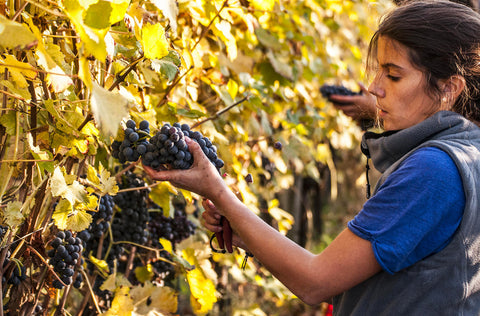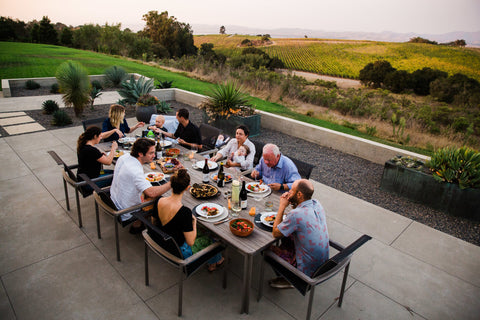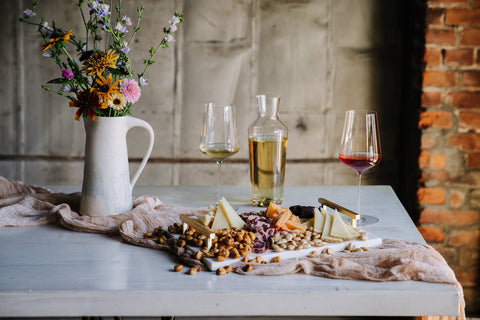Last fall, I was sitting at King in New York with my girlfriend and parents. We ordered a bottle of Giulia Negri’s Langhe Chardonnay to pair with a white-clothed table crowded with plates of glistening pasta. It was sublime. A hint of orange peel and almond, a creaminess and complexity — it had a larger-than-life elegance, a surrealness to it like the best vintage Schiaparelli dress. Short version: it was a great wine. The fact that it was made by a woman almost exactly my age? It made the experience ten times better.
It wouldn’t have been possible if I didn’t know Giulia’s name and story. That’s why, as International Women’s Day approaches, we’re celebrating women in wine on all fronts, but especially the winemakers like Giulia. We want you to know their names and stories, to be able to seek out their wines on restaurant lists and store shelves. We — and they — also want you to understand that the game is still rigged. And if we want more amazing wine, like that Langhe Chardonnay, we’ve got to tune into the women winemakers who are telling us loud and clear what we need to do to make it better. That’s what you’ll find if you keep reading.
You’d be hard-pressed to find an accurate international statistic on women winemakers. Generally speaking, there are far fewer than there are men. Approximately 14% of the more than 4200 wineries in California reported a woman as their lead winemaker in a 2020 study by the University of Santa Clara. It’s estimated that about one-third of France’s vineyards are led by women, and a quarter of Italy’s winemakers are women. There are exceptions to the rule, — in Rias Baixas, over half of all winemakers are women — but the rule stands.
Things are changing. That 14% figure from California? It’s up from 10% in 2011. In the world of wine auctions, both Christie’s and Sotheby’s have reported that the number of women bidders is slowly inching up. Whether they pursue accreditation through the Court of Master Sommeliers or the Wine and Spirits Education Trust, there are more women at the highest levels of wine than ever before.
What Drives Them
With the deck stacked against you, what keeps women going? Michele Smith of Domaine Smith-Chapel in the Beaujolais says that other women winemakers have inspired her. “Even before I moved to Beaujolais, vigneronne Julie Balagny was a large inspiration for me. Her legacy motivates me to be defiant and follow what I love.” Julie was a remarkable winemaker whose work in Fleurie has left a lasting imprint on anyone lucky enough to have tasted it.
Women winemakers are also an inspiration to younger women entering the industry through different paths. Take Ariel Moss, who works in our Burlington Wine Bar. She says she looks up to Michèle Aubéry-Laurent from Domaine Gramenon. "Michèle is an inspiration to me," Ariel says, "because she exemplifies resilience, innovation, and winemaking that accentuates the natural beauty of the terroir. Michèle is true to the exceptionality of her wine and it is clear from the first sip.”
There are too many others to count, but we’ll name a few: The iconic Cathy Corison, part of the OG wave of California winemakers crafting terroir-driven wines in the 70s and 80s. Or Mee Goddard, the one-women-show making age-worthy Morgon from a tiny parcel of vines. Elisa Guerin, also of Beaujolais, and rising star Sandra Bravo of Sierra de Toloño. There's Arianna Occhipinti in Sicily, Gina Giugni of Lady of the Sunshine in California’s Central Coast, Cati Ribot in Mallorca, and Dolores Cabrera in the Canary Islands. In Dedalus’s home state of Vermont, we can think of Deirdre Heekin of la Garagista, Kendra Knapick of Ellison Estate Vineyard, and Camila Carillo of la Montañuela.
What Gets in the Way
So what are some of the roadblocks we need to tackle? Michele says that employers need to shake gender bias out of their hiring process. “Employers must create promotions to actual leadership roles rather than just supporting characters,” she explains. Beyond hiring and promoting, she says that benefits play an important role in promoting equality. “If an employer wants to invest in their employees in more than a performative manner, real support would require providing access to health and family care.”
Faith Armstrong is a winemaker based in California. She’s the genius behind Onward, Farmstrong, and the exclusive-to-Dedalus Lumita wines. She says that being a mom of four and a 100% owner of her company has been challenging. “It’s difficult to manage the time-consuming nature of parenting and entrepreneurship, and also winemaking as a day job. The schedule is very demanding, especially during harvest.” Whatever way you slice it, working and parenting is a lot to handle — especially for women, who tend to take on more domestic responsibilities than their male counterparts. “We put an unbelievable amount of pressure on ourselves and I have spent my entire life since I have been a mom feeling like I was either letting my kids down or my career.”
The demanding schedule, lack of access to health and family care, and biased hiring and promotion practices are just a few of the roadblocks women face when entering the wine industry. There are also more sinister barriers: take the harassment and abuse scandals that have rocked the Court of Master Sommeliers, or any number of horror stories from young women working in the wine service industry.
What We Can Do
The inspiration is there. The role models? Modeling. So what needs to happen to level the playing field in the wine industry? “I believe women consumers are the biggest key to this equation,” Faith says. Women consume more wine than men and purchase more wine than men. “If we include a women winemaker section on the shelves or restaurant list, if we feature women winemakers in events, it raises awareness of wines that are made by, owned by, distributed by women.” Essentially, we support women by making their work visible and valuing it for what it’s worth.
“Gender bias has insidious ways of showing up,” Michele says. “I will say the same thing that I tell my two daughters and will tell our two boys when they are old enough to understand: to ‘fight smarter and not harder’ against it, never let anyone determine your worth, resist complacency, and never accept the status quo. Children learn best by example so some of the initiatives we take at the domaine are: to hire women and support them in roles outside of the traditional gender norms. We work to create community by donating time, advice, and equipment as well as promoting wines made by other women winemakers.”
Check out our collection of wines made or owned by women. The women producers we champion make wines that are a joy to drink. Like every bottle in our shop, they’re made intentionally with minimal intervention. We love drinking these wines every day of the year and hope that you will too as you get familiar with their names.



